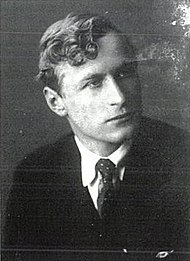Anders Lange | |
|---|---|
 Anders Lange in the 1930s. | |
| Leader of the Anders Lange's Party | |
| In office 8 April 1973 – 18 October 1974 | |
| Preceded by | Position established |
| Succeeded by | Eivind Eckbo |
| Member of the Norwegian Parliament | |
| In office 1 October 1973 – 18 October 1974 | |
| Constituency | Oslo |
| Personal details | |
| Born | 5 September 1904 Aker, Akershus, Norway |
| Died | 18 October 1974 (aged 70) Bærum, Akershus, Norway |
| Political party | Anders Lange's Party |
| Other political affiliations | Fatherland League (1929–38) Landsforeningen Norges Sjøforsvar (1938–40) |
| Spouse(s) | Anne-Marie Bach-Evensen, 1930–52 (divorced) Karin Thurmann-Moe, 1952–74 (his death) |
| Children | Four |
Anders Sigurd Lange (5 September 1904 – 18 October 1974) was a Norwegian political organiser, speaker and editor who led his eponymously named political party Anders Lange's Party into parliament in 1973.
Educated as a forestry technician, Lange got involved in politics following his stay in Argentina in the late 1920s. He joined the right-wing Fatherland League organisation upon his return to Norway in 1929, and he became a popular speaker at public rallies. His provocative style however often led to controversies. Although his agitation was chiefly directed against the political left, he also rejected the efforts of the far-right. He left the organisation in 1938 to join Landsforeningen Norges Sjøforsvar, where he agitated for strengthening the Norwegian armed forces and warned against the future world war. He was initially blocked from entering the organised Norwegian resistance during the Second World War, but nonetheless did work to assist resistance members, and he was arrested by the Germans and imprisoned twice.
After the war, Lange initially focused on his work as a kennel-owner, as well as to write and publish his own dog-owner's paper. Although he had pledged to not enter politics again, he became increasingly politically active. He started touring the country to speak at his public rallies, and the paper he published became increasingly political. He was a charismatic right-wing public speaker who first and foremost objected to high taxes, state-regulations and public bureaucracy. He gained a considerable following among youth in the 1960s, and their activities included to counter-demonstrate against left-wing demonstrations. Increasingly called upon by his supporters to establish a new political party, it was not until 1973 that he finally agreed to do so. The new party, named Anders Lange's Party (ALP) was founded by popular acclamation during a public meeting at Saga kino. He successfully entered the Norwegian Parliament after the election later the same year, but his new-found political career came to an abrupt end when he died the following year. Lange's political party was reformed and renamed to the Progress Party after his death.